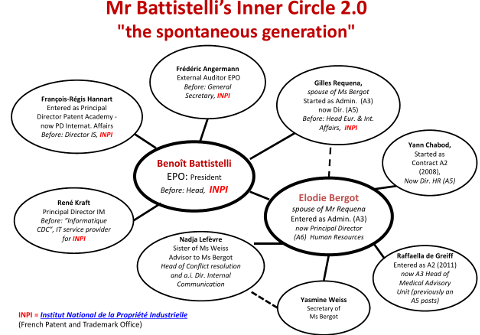

PUBLISHED BY Watchtroll yesterday was an article entitled "Latest CAFC [Federal Circuit] Ruling in Cleveland Clinic Case Confirms That USPTO’s 101 [35 U.S.C. €§ 101, based on SCOTUS] Guidance Holds Little Weight" and it's about that old stunt from the Director of the U.S. Patent and Trademark Office (USPTO), who got 'dissed' by judges for his efforts to work around them. There's an analogy here -- one that ought to be made and emphasised. The European Patent Office (EPO) has long ignored if not attacked judges. Donald Trump appointed an ‘American Battistelli’ and it leads to friction between the Office and the courts. What matters more? Profits or the law? Can profit be made at the expense of the law? Put another way, can the law be violated in order to increase profits (for the Office)?
"Donald Trump appointed an ‘American Battistelli’ and it leads to friction between the Office and the courts."Antonella Gentile, over at IP Kat, cited Watchtroll the same day when dealing with software patents in Europe (disguised as "AI" under the António Campinos administration). To quote: "The IPWatchdog [Watchtroll] analyses the European Patent Office's new guidance for examination for AI and ML patent applications (issued in November 2018) and the U.S. Patent and Trademark Office's revised guidance directed to what constitutes patent eligible subject matter under 35 U.S.C. €§101 (issued in January 2019) and considers how these guidance will shape the examination of Artificial Intelligence Inventions."
IP Kat, in an earlier post, also mentioned the violation of the EPC for the sake of patent maximalists:
In Purity can be unconventional, a new position for the EPO boards of appeal (T 1085/13), GuestKat Rose Hughes takes a look at a recent decision by the EPO Technical Boards of Appeal which departs from previous boards on how the novelty of the increased purity of a known compound is to be assessed. Rose also discusses the technical board of appeal’s decision following the decision T-1063/18 and concerning the power of the EPO’s Administrative Council to amend the EPC using the Rules. Finally, Rose reports on a new question of double-patenting being referred to the Enlarged Board of Appeal (EBA).
"The situation in INPI really mirrors the EPO's mentality, where patents now boil down to a numbers "game" (or "competition") irrespective of underlying quality/validity."In an effort to bypass the courts (external to the EPO) Team Battistelli hoped to prop up the UPC. It failed. 4 years ago in the EPO's PR stunts (warning: epo.org link) of Benoît Battistelli they said: "It is hoped that the first unitary patent could be seen as early as the second half of 2016."
It never happened. Never will (probably). What Battistelli hoped for is a sort of "leap" above justice. Patents would be granted without proper scrutiny and then asserted without a proper legal process. Good for plaintiffs, surely, but not for anybody else. Think of INPI in France. There's no patent examination there; everything that applicants file gets registered as patents (as long as basic standards are adhered to).
A few days ago we spotted this puff piece about Valeo. It says that "Valeo remains France’s leading patent filer for third year in a row," but with no patent examination this is such a meaningless number. To quote:
For the third year running, Valeo has taken first place in France’s INPI industrial property institute rankings, with 1,355 patents published in 2018, versus 1,110 in 2017, consolidating its position as the most innovative company in France.